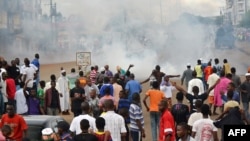Since gaining independence from France in 1958, the West African nation of Guinea has endured many setbacks on the road to democratic government. The country has had a history of autocratic leadership and military coups, impinging human rights, political debate and free expression.
That record reached its lowest point three years ago, when security forces massacred peaceful protestors at an opposition rally in the capital, Conakry. The United States, with Guineans and others around the world, wishes to commemorate the tragedy and call for an end to political violence and impunity in Guinea.
The violence erupted on September 28, 2009, when members of the elite presidential guard fired on a crowd of thousands gathered in a sports stadium to protest against Captain Moussa Dadis Camara, the leader of the military junta that took power in December 2008, and his candidacy in January 2010 elections. Accounts vary on what set off the melee, but a consensus suggests security forces tried to disrupt the rally by firing tear gas into the crowd, and when panic ensued, they began indiscriminately firing at unarmed civilians. Rally leaders were arrested, at least 150 people were killed, and more than 100 women were raped and suffered other forms of sexual abuse. Camara was later wounded in an assassination attempt and Alpha Conde was elected president in 2010.
Political turmoil did not end there, however. Last year, three protestors were killed during clashes with police and demonstrators at a banned rally calling for legislative elections. And this July, security forces clashed violently with villagers demanding jobs at a proposed mining project.
The United States calls on the government and people of Guinea to accelerate the pace of the nation’s democratic progress. Timely and transparent legislative elections are long overdue. Those responsible for the 2009 Conakry massacre must be identified and held accountable. And a dual process of national reconciliation and justice sector reform must begin that will address the nation’s long history of political violence and impunity.
We also call on protestors to remain peaceful, the government to respect freedom of assembly, and the police to refrain from excessive use of force.
That record reached its lowest point three years ago, when security forces massacred peaceful protestors at an opposition rally in the capital, Conakry. The United States, with Guineans and others around the world, wishes to commemorate the tragedy and call for an end to political violence and impunity in Guinea.
The violence erupted on September 28, 2009, when members of the elite presidential guard fired on a crowd of thousands gathered in a sports stadium to protest against Captain Moussa Dadis Camara, the leader of the military junta that took power in December 2008, and his candidacy in January 2010 elections. Accounts vary on what set off the melee, but a consensus suggests security forces tried to disrupt the rally by firing tear gas into the crowd, and when panic ensued, they began indiscriminately firing at unarmed civilians. Rally leaders were arrested, at least 150 people were killed, and more than 100 women were raped and suffered other forms of sexual abuse. Camara was later wounded in an assassination attempt and Alpha Conde was elected president in 2010.
Political turmoil did not end there, however. Last year, three protestors were killed during clashes with police and demonstrators at a banned rally calling for legislative elections. And this July, security forces clashed violently with villagers demanding jobs at a proposed mining project.
The United States calls on the government and people of Guinea to accelerate the pace of the nation’s democratic progress. Timely and transparent legislative elections are long overdue. Those responsible for the 2009 Conakry massacre must be identified and held accountable. And a dual process of national reconciliation and justice sector reform must begin that will address the nation’s long history of political violence and impunity.
We also call on protestors to remain peaceful, the government to respect freedom of assembly, and the police to refrain from excessive use of force.















